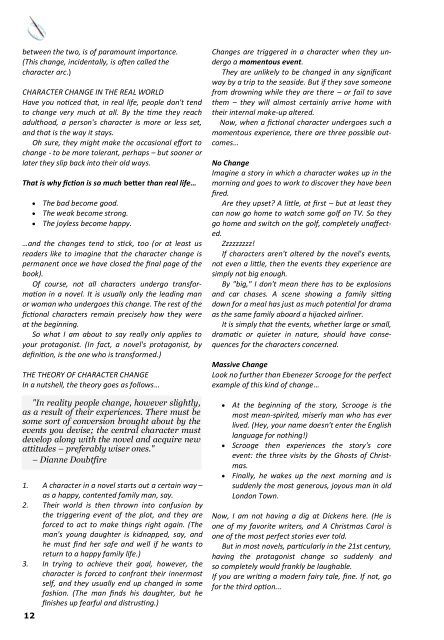Writers-Wheel-Magazine-Issue-6-Midsummer-2015
Writers-Wheel-Magazine-Issue-6-Midsummer-2015
Writers-Wheel-Magazine-Issue-6-Midsummer-2015
Create successful ePaper yourself
Turn your PDF publications into a flip-book with our unique Google optimized e-Paper software.
etween the two, is of paramount importance.(This change, incidentally, is often called thecharacter arc.)CHARACTER CHANGE IN THE REAL WORLDHave you noticed that, in real life, people don't tendto change very much at all. By the time they reachadulthood, a person's character is more or less set,and that is the way it stays.Oh sure, they might make the occasional effort tochange - to be more tolerant, perhaps – but sooner orlater they slip back into their old ways.That is why fiction is so much better than real life…12 The bad become good. The weak become strong. The joyless become happy.…and the changes tend to stick, too (or at least usreaders like to imagine that the character change ispermanent once we have closed the final page of thebook).Of course, not all characters undergo transformationin a novel. It is usually only the leading manor woman who undergoes this change. The rest of thefictional characters remain precisely how they wereat the beginning.So what I am about to say really only applies toyour protagonist. (In fact, a novel's protagonist, bydefinition, is the one who is transformed.)THE THEORY OF CHARACTER CHANGEIn a nutshell, the theory goes as follows…"In reality people change, however slightly,as a result of their experiences. There must besome sort of conversion brought about by theevents you devise; the central character mustdevelop along with the novel and acquire newattitudes – preferably wiser ones."– Dianne Doubtfire1. A character in a novel starts out a certain way –as a happy, contented family man, say.2. Their world is then thrown into confusion bythe triggering event of the plot, and they areforced to act to make things right again. (Theman's young daughter is kidnapped, say, andhe must find her safe and well if he wants toreturn to a happy family life.)3. In trying to achieve their goal, however, thecharacter is forced to confront their innermostself, and they usually end up changed in somefashion. (The man finds his daughter, but hefinishes up fearful and distrusting.)Changes are triggered in a character when they undergoa momentous event.They are unlikely to be changed in any significantway by a trip to the seaside. But if they save someonefrom drowning while they are there – or fail to savethem – they will almost certainly arrive home withtheir internal make-up altered.Now, when a fictional character undergoes such amomentous experience, there are three possible outcomes…No ChangeImagine a story in which a character wakes up in themorning and goes to work to discover they have beenfired.Are they upset? A little, at first – but at least theycan now go home to watch some golf on TV. So theygo home and switch on the golf, completely unaffected.Zzzzzzzzz!If characters aren't altered by the novel's events,not even a little, then the events they experience aresimply not big enough.By "big," I don't mean there has to be explosionsand car chases. A scene showing a family sittingdown for a meal has just as much potential for dramaas the same family aboard a hijacked airliner.It is simply that the events, whether large or small,dramatic or quieter in nature, should have consequencesfor the characters concerned.Massive ChangeLook no further than Ebenezer Scrooge for the perfectexample of this kind of change…At the beginning of the story, Scrooge is themost mean-spirited, miserly man who has everlived. (Hey, your name doesn't enter the Englishlanguage for nothing!)Scrooge then experiences the story's coreevent: the three visits by the Ghosts of Christmas.Finally, he wakes up the next morning and issuddenly the most generous, joyous man in oldLondon Town.Now, I am not having a dig at Dickens here. (He isone of my favorite writers, and A Christmas Carol isone of the most perfect stories ever told.But in most novels, particularly in the 21st century,having the protagonist change so suddenly andso completely would frankly be laughable.If you are writing a modern fairy tale, fine. If not, gofor the third option...


